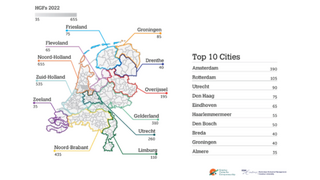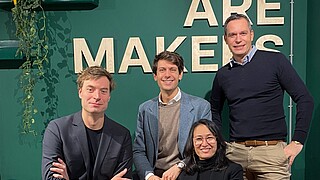The ScaleUp Dashboard is an annual research project and provides insight into the landscape and state of HGFs in the Netherlands. The publication is part of the long-term research into HGFs of Erasmus Centre for Entrepreneurship and Rotterdam School of Management, Erasmus University and led by Prof. dr. Justin Jansen, Professor Corporate Entrepreneurship at Rotterdam School of Management, Erasmus University & Senior Fellow at Erasmus Centre for Entrepreneurship. A high-growth firm (HGF), also known as a scaleup, is a company with an average annualised growth of 20 percent or more per year in employees and/or turnover during a measurement period of 3 years.
The key takeaways of the ScaleUp Dashboard 2022 are as follows:
- The number of high-growth firms in the Netherlands dropped for the second year in a row, from 2,720 HGFs in 2020 to 2,605 in 2021: a decrease of 4.2%. This decline already took off in 2019, before COVID hit the shores, when growth came to a stand-still. Nevertheless, there is a flattening of the downward trend and HGFs are growing at a faster pace than previous years.
- While job creation has marginally shrunk, the number of jobs created by HGFs has increased to 75.6 new FTEs over the last three years.
- The number of startups that grew into young HGFs in 2021 faces a sharp decline of 16.1 percent in comparison to 2020 (5.1%).
- Companies seem to be shrinking aggressively in recent years by accounting for more than the 45% of Dutch SMEs in 2021. Fortunately, the proportion of growing companies (49%) exceed this shrinking group.
- South Holland is catching up with North Holland with a difference of only 35 companies between the top provinces. Comparably with 2020, approximately 55% of the number of HGFs are located in North Holland (21%), South Holland (20%), and North Brabant (16 %), while Amsterdam still holds the first position as the city with the most number of HGFs.
- The wholesale and retail sector remain in the first position in terms of number of HGFs in 2021 (520), while consultancy, research, and other specialised business services (335) and information and communication follow (315), taking the second and third place respectively.
- The percentage of scaleups with women founders has declined continuously in the past few years from 13% in 2017 to 9.9% in 2021.
The Dutch scaleup ecosystem does not perform well regarding these two indicators; amount of scaleups and sustainable scaling.
“Signals are clearly on red. We need to realise that we need to start taking important steps now as an ecosystem. Not just solutions around capital and talent, but certainly more long-term support to develop decisive skills. Right now, too many measures are too generic and thus less relevant to address specific challenges of high-growth companies and young scaleups." According to Prof. dr. Justin Jansen, "This means that a lot of potential in terms of impactful scaling is still not realised.” An emphasis needs to be placed on ensuring more sustainable growth paths through more capacity building, at the company as well as ecosystem level. Jansen urges that: “To be able to deal with emergent challenges, and to come up with fruitful solutions for the future, we need to start reflecting on what we have now, and what we need in order to be successful in the long run.”
As the Dutch economy gradually recovers from COVID-19, companies are presented with new challenges such as the continuous shortage of human capital and inflation. Therefore, agility, leadership, as well as sustainable growth become matters of urgent attention for all stakeholders in the ecosystem (from entrepreneurs to investors, from policymakers to innovation drivers) to collectively reflect on and to share insights and resources towards a successful problem-solving and thus, a flourishing economy and society at large.
The full report can be downloaded here: ece.typeform.com/to/o2ytjRGW (ENG); More information about the ScaleUp Dashboard can be found at: www.scaleupdashboard.com
Erasmus Centre for Entrepreneurship is Europe’s leading entrepreneurship centre. Driven by the belief that entrepreneurship is the most important driver for innovation, we strive to embed entrepreneurship into everyone’s DNA, leveraging the knowledge and network of Erasmus University Rotterdam, a university founded by entrepreneurs more than 100 years ago. The ScaleUp Dashboard is one of the most advanced research projects that we conduct every year to monitor the Dutch innovation ecosystem and it is the only long-term research on scaleups in the Netherlands. www.ece.nl
Prof. dr. Justin Jansen is Professor of Corporate Entrepreneurship at the Rotterdam School of Management, Erasmus University (RSM) and Senior Fellow at Erasmus Centre for Entrepreneurship. His research on strategic leadership, entrepreneurship, innovation and high-growth companies has been published in leading international journals. Jansen has translated his insights into growth programs and roadmaps for growth companies to continue to realize new growth opportunities in the long(er) term. He is considered one of the top 100 professors in the field of entrepreneurship who plays a crucial role in developing and guiding the entrepreneurs of the future.


